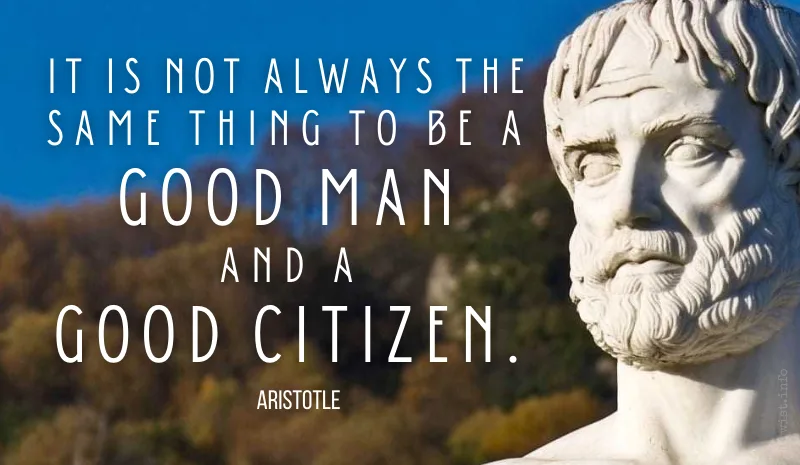I would remind my countrymen, that they are to be men first, and Americans only at a late and convenient hour. No matter how valuable law may be to protect your property, even to keep soul and body together, if it do not keep you and humanity together.
Henry David Thoreau (1817-1862) American philosopher and writer
Speech (1854-07-04), “Slavery in Massachusetts,” Anti-Slavery Celebration, Framingham, Massachusetts
(Source)
After the conviction in Boston of Anthony Burns, under the Fugitive Slave Act of 1850. This led to large protests and an abolitionist riot at the Boston Courthouse, requiring Federal troops and state militia to ensure Burns' transport to a ship sailing to Virginia.
Quotations about:
civic duty
Note not all quotations have been tagged, so Search may find additional quotes on this topic.
For of course it is not always the same thing to be a good man and a good citizen.
[οὐ γὰρ ἴσως ταὐτὸν ἀνδρί τ᾽ ἀγαθῷ εἶναι καὶ πολίτῃ παντί.]
Aristotle (384-322 BC) Greek philosopher
Nicomachean Ethics [Ἠθικὰ Νικομάχεια], Book 5, ch. 2 (5.2.11) / 1130b.29 (c. 325 BC) [tr. Thomson (1953)]
(Source)
Aristotle suggests the distinction comes when a regime is corrupt or unjust, at which point carrying out the duties of a good citizen (supporting the regime) may not align with an individual's virtues.
See also Aristotle, Politics.
(Source (Greek)). Alternate translations:For perhaps it is not the same thing to be a good man, and a good citizen.
[tr. Taylor (1818), 5.2]It may be it is not the same thing to be a good man and a good citizen in every case.
[tr. Chase (1847), 5.4]The perfection of the man is not perhaps in all cases identical with the perfection of the citizens.
[tr. Williams (1869), 5.2]It is possibly not the same thing in all cases to be a good man and to be a good citizen.
[tr. Welldon (1892), 5.5]It is possible that to be a good man is not the same as to be a good citizen of any state whatever.
[tr. Peters (1893), 5.2]Perhaps it is not the same to be a good man and a good citizen of any state taken at random.
[tr. Ross (1908), 5.2]It would seem that to be a good man is not in every case the same thing as to be a good citizen.
[tr. Rackham (1934), 5.2.11]For being a good man is presumably not in every case the same as being a good citizen.
[tr. Reeve (1948)]For perhaps to be a good man is not the same as to be a good citizen in every case.
[tr. Apostle (1975)]Presumably it is not always the same thing to be a good man and a good citizen.
[tr. Thomson/Tredennick (1976)]For, presumably, being a good man is not the same as being every sort of good citizen.
[tr. Irwin/Fine (1995)]For, presumably, being a good person is not in every case the same as being a good citizen.
[tr. Crisp (2000)]For perhaps it is not the same thing in every case to be a good man and to be a good citizen.
[tr. Bartlett/Collins (2011)]
We cannot, by total reliance on law, escape the duty to judge right and wrong [….] There are good laws and there are occasionally bad laws, and it conforms to the highest traditions of a free society to offer resistance to bad laws, and to disobey them.
Alexander M. Bickel (1924-1974) Romanian-American law professor, constitutional scholar
Politics and the Warren Court, Part 3, ch. 5 “Civil Rights and Civil Disobedience” (1965)
(Source)
That city [is best to live in,] in which those who are not wronged, no less than those who are wronged, exert themselves to punish the wrongdoers.
Solon (c. 638 BC - 558 BC) Athenian statesman, lawmaker, poet
Quoted in Plutarch, Parallel Lives, “The Life of Solon,” sec. 18.5 [tr. Perrin (1914)]
(Source)
Alt. trans.:
- "That [city is best managed] in which those who are not wronged espouse the cause of those who are, and punish their oppressors." [tr. Stewart, Long (1894)]
- "That [city is best modeled] where those that are not injured try and punish the unjust as much as those that are." [Source]
- "That [city is best modeled] where those who are not injured, are as ready to prosecute and punish offenders, as those who are." [tr. Langhorne, Langhorne (1819)]
- "The city [is best governed of all] where those who have not been wronged show themselves just as ready to punish the offender as thouse who have been." [tr. Scott-Kilvert (1960)]
- Paraphrased as "Justice can be secured in Athens if those who are not injured feel as indignant as those who are," in Earl Warren, "The Law and the Future," Fortune (Nov 1955).
For politics ought to be the part-time profession of every citizen who would protect the rights and privileges of free people and who would preserve what is good and fruitful in our national heritage. Politics must be the concern of every citizen who wants to see our national well-being increased and our international leadership strengthened. In that combined sense, politics is the noblest of professions. In the ranks of that kind of politics, every American should be enrolled.
Dwight David Eisenhower (1890-1969) American general, US President (1953-61)
Speech, Republican Lincoln Day Dinners (28 Jan 1954)
(Source)
Often paraphrased: "Politics ought to be the part-time profession of every citizen who would protect the rights and privileges of free men."
The speech was filmed for the Republican National Committee and distributed to state and local committees to be shown at the Lincoln Day dinners.
But freedom isn’t free. It shouldn’t be a bragging point that, “Oh, I don’t get involved in politics,” as if that makes someone cleaner. No, that makes you derelict of duty in a republic. Liars and panderers in government would have a much harder time of it if so many people didn’t insist on their right to remain ignorant and blindly agreeable.
Public virtue cannot exist in a nation without private, and public virtue is the only foundation of republics. There must be a positive passion for the public good, the public interest, honour, power and glory, established in the minds of the people, or there can be no republican government, nor any real liberty: and this public passion must be superior to all private passions.
For in a democracy, every citizen, regardless of his interest in politics, “holds office”; every one of us is in a position of responsibility; and, in the final analysis, the kind of government we get depends upon how we fulfill those responsibilities. We, the people, are the boss, and we will get the kind of political leadership, be it good or bad, that we demand and deserve.
If a man has a genuine, sincere, hearty wish to get rid of his liberty, if he is really bent upon becoming a slave, nothing can stop him. And the temptation is to some natures a very great one. Liberty is often a heavy burden on a man. It involves that necessity for perpetual choice which is the kind of labor men have always dreaded. In common life we shirk it by forming habits, which take the place of self-determination. In politics party-organization saves us the pains of much thinking before deciding how to cast our vote. In religious matters there are great multitudes watching us perpetually, each propagandist ready with his bundle of finalities, which having accepted we may be at peace. The more absolute the submission demanded, the stronger the temptation becomes to those who have been long tossed among doubts and conflicts.
Oliver Wendell Holmes, Sr. (1809-1894) American poet, essayist, scholar
Elsie Venner, ch. 18 (1859)
(Source)
Taxes are what we pay for civilized society.
Oliver Wendell Holmes, Jr. (1841-1935) American jurist, Supreme Court Justice
Compania General De Tabacos De Filipinas v. Collector of Internal Revenue, 275 U.S. 87, 100 (1927) [Dissent]
(Source)
Full text is "Taxes are what we pay for civilized society, including the chance to insure.
References are also found (without citation) to a 1904 speech, "Taxes are the price we pay for a civilized society" (this variation is quoted by the IRS above the entrance of their headquarters). Bartlett's (1980) cites the above wording, but incorrectly claims it was in 1904.
In Felix Frankfurter, Mr. Justice Holmes and the Supreme Court (1938), Holmes is quoted as rebuking a secretary's query about hating to pay taxes: "No, young feller. I like to pay taxes. With them I buy civilization."
More information here.
CALVIN: When I grow up, I’m not going to read the newspaper and I’m not going to follow complex issues and I’m not going to vote. That way I can complain when the government doesn’t represent me. Then, when everything goes down the tubes, I can say the system doesn’t work and justify my further lack of participation.
HOBBES: An ingeniously self-fulfilling plan.
CALVIN: It’s a lot more fun to blame things than to fix them.
What I have desired to do is to make the people of Boston realize that the most important office, and the one which all of us can and should fill, is that of private citizen. The duties of the office of private citizen cannot under a republican form of government be neglected without serious injury to the public.
Louis Brandeis (1856-1941) American lawyer, activist, Supreme Court Justice (1916-39)
Statement to a reporter, Boston Record (14 Apr 1903)
Quoted in Alpheus Thomas Mason, Brandeis: A Free Man's Life (1946).Commonly paraphrased:
- "The most important office is that of the private citizen"
- "The most important political office is that of the private citizen"
Full and free expression of the right by the citizen is ordinarily also his duty; for its exercise is more important to the Nation than it is to himself. Like the course of the heavenly bodies, harmony in national life is a resultant of the struggle between contending forces. In the frank expression of conflicting opinions lies the greatest promise of wisdom in governmental action.
The punishment which the wise suffer who refuse to take part in the government is to live under the government of worse men.
Plato (c.428-347 BC) Greek philosopher
Republic, Book 1, 347c
In Ralph Waldo Emerson, "Eloquence," Society and Solitude (1870).
Alt. trans.:More discussion here.
- "One of the penalties for refusing to participate in politics, is that you end up being governed by your inferiors."
- The Constitution Party (1952-68) used on their letterhead the variant, "The penalty good men pay for indifference to public affairs is to be ruled by evil men."
- "The price of apathy is to be ruled by evil men."
- "Those who are too smart to engage in politics are punished by being governed by those who are dumber."
In context (Plato in Twelve Volumes, Vols. 5 & 6 [tr. Shorey (1969)]):[346e] "Then, Thrasymachus, is not this immediately apparent, that no art or office provides what is beneficial for itself -- but as we said long ago it provides and enjoins what is beneficial to its subject, considering the advantage of that, the weaker, and not the advantage the stronger? That was why, friend Thrasymachus, I was just now saying that no one of his own will chooses to hold rule and office and take other people's troubles in hand to straighten them out, but everybody expects pay for that, [347a] because he who is to exercise the art rightly never does what is best for himself or enjoins it when he gives commands according to the art, but what is best for the subject. That is the reason, it seems, why pay must be provided for those who are to consent to rule, either in form of money or honor or a penalty if they refuse." "What do you mean by that, Socrates?" said Glaucon. "The two wages I recognize, but the penalty you speak of and described as a form of wage I don't understand." "Then," said I, "you don't understand the wages of the best men [347b] for the sake of which the finest spirits hold office and rule when they consent to do so. Don't you know that to be covetous of honor and covetous of money is said to be and is a reproach?" "I do," he said. "Well, then," said I, "that is why the good are not willing to rule either for the sake of money or of honor. They do not wish to collect pay openly for their service of rule and be styled hirelings nor to take it by stealth from their office and be called thieves, nor yet for the sake of honor, [347c] for they are not covetous of honor. So there must be imposed some compulsion and penalty to constrain them to rule if they are to consent to hold office. That is perhaps why to seek office oneself and not await compulsion is thought disgraceful. But the chief penalty is to be governed by someone worse if a man will not himself hold office and rule. It is from fear of this, as it appears to me, that the better sort hold office when they do, and then they go to it not in the expectation of enjoyment nor as to a good thing, but as to a necessary evil and because they are unable to turn it over to better men than themselves [347d] or to their like. For we may venture to say that, if there should be a city of good men only, immunity from office-holding would be as eagerly contended for as office is now, and there it would be made plain that in very truth the true ruler does not naturally seek his own advantage but that of the ruled; so that every man of understanding would rather choose to be benefited by another than to be bothered with benefiting him. "






















